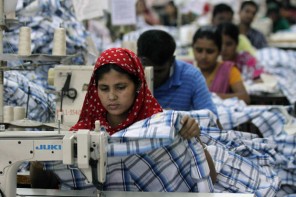In a recent interview H&M’s head of sustainability, Helena Helmersson, told Reuters that she believes there is no conflict between the company’s mission of selling cheap clothing whilst looking out for the environment and ensuring ethical wages and working conditions for its suppliers.
“We want to make sustainable fashion more democratic,” Helena Helmersson, H&M’s head of sustainability, told Reuters.
“We don’t aim for sustainability to be a luxury thing.”
‘A’ for Effort
H&M was the world’s top buyer of organic cotton from 2010 to 2011. (It fell to second place, ranking just behind Dutch chain store C&A, in 2012.) The retailer has also committed to eliminate the use of hazardous chemicals from all production processes associated with the manufacture of its products by 2020, after pressure from Greenpeace.
In 2012, the company launched the world’s first global clothes-recycling initiative, one that spanned all 48 of its markets. After a deadly building collapsed in Bangladesh killed 1,129 workers in April 2013, H&M was among the first to sign the legally binding Bangladesh Fire and Building Safety Accord.
H&M has even pledged to pay deliver a “living wage” to more than 850,000 textile workers by 2018—with or without raising prices at the till.
“We don’t aim for sustainability to be a luxury thing.”
But despite their efforts H&M placed second last in a recent perceived sustainability ranking survey conducted in their biggest market, Germany.
“What hurts H&M is an assumption that they must be exploiting their workers because they produce cheap clothes,” said Joachim Schoepfer, head of corporate reputation for the Serviceplan agency, which conducts an annual survey on companies’ image in Germany.
Although Helmersson said that committing to sustainability can boost the bottom line by, say, reducing water use to grow cotton, improving energy efficiency, or applying fewer chemicals, labor advocates are more circumspect about how that translates to employment says Ecouterre.
“There is a direct causal relationship between excessive price pressure on factories and labor rights abuses. It is an unavoidable fact—virtually a truism—that it costs more to produce under good conditions than bad conditions,” Scott Nova, executive director of the Workers Rights Consortium, told the eco publication. “It is possible to have both decent conditions and reasonably affordable clothing, but factories have to be paid more than most are currently receiving and the industry’s obsession with achieving the lowest costs humanly possible must give way to a more rational approach.”
What do you think… Can fashion be cheap and ethical let us know in the comments below.
Image here









